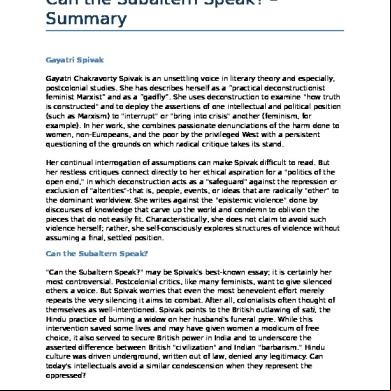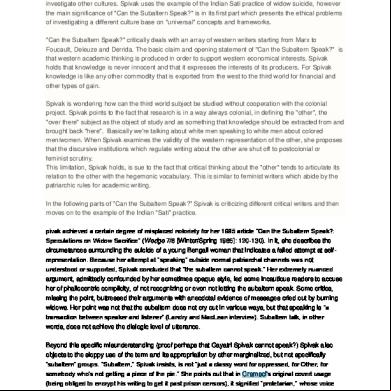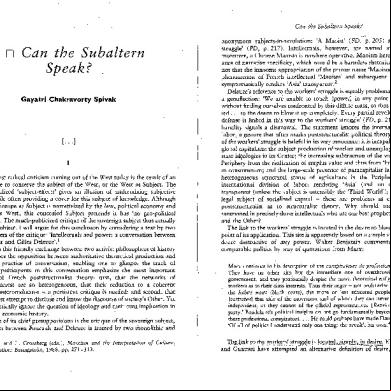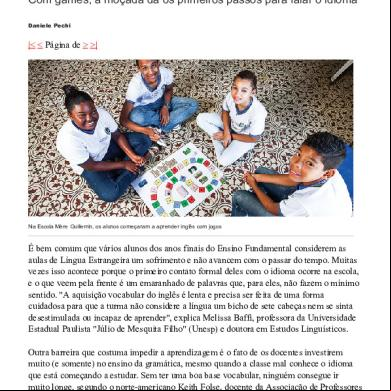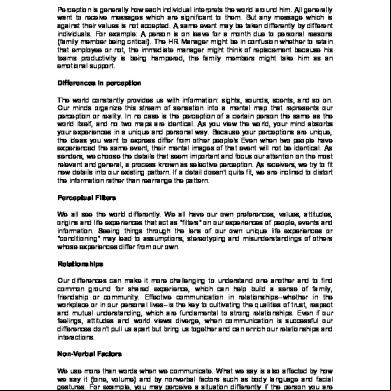Can Subaltern Speak Summary 364066
This document was ed by and they confirmed that they have the permission to share it. If you are author or own the copyright of this book, please report to us by using this report form. Report 3zb22
Overview 124f1p
& View Can Subaltern Speak Summary as PDF for free.
More details 2x4n45
- Words: 1,205
- Pages: 3
Gayatri Spivak / "Can the Subaltern Speak?" – summary "Can the Subaltern Speak?" (1988) by Gayatri Spivak relates to the manner in which western cultures investigate other cultures. Spivak uses the example of the Indian Sati practice of widow suicide, however the main significance of "Can the Subaltern Speak?" is in its first part which presents the ethical problems of investigating a different culture base on "universal" concepts and frameworks. "Can the Subaltern Speak?" critically deals with an array of western writers starting from Marx to Foucault, Deleuze and Derrida. The basic claim and opening statement of "Can the Subaltern Speak?" is that western academic thinking is produced in order to western economical interests. Spivak holds that knowledge is never innocent and that it expresses the interests of its producers. For Spivak knowledge is like any other commodity that is exported from the west to the third world for financial and other types of gain. Spivak is wondering how can the third world subject be studied without cooperation with the colonial project. Spivak points to the fact that research is in a way always colonial, in defining the "other", the "over there" subject as the object of study and as something that knowledge should be extracted from and brought back "here". Basically we're talking about white men speaking to white men about colored men/women. When Spivak examines the validity of the western representation of the other, she proposes that the discursive institutions which regulate writing about the other are shut off to postcolonial or feminist scrutiny. This limitation, Spivak holds, is sue to the fact that critical thinking about the "other" tends to articulate its relation to the other with the hegemonic vocabulary. This is similar to feminist writers which abide by the patriarchic rules for academic writing. In the following parts of "Can the Subaltern Speak?" Spivak is criticizing different critical writers and In "Can the Subaltern Speak?" Gayatri Spivak is criticizing the intellectual west's "desire for subjectivity". Spibak claims that "research" or "knowledge" have served as a prime justification for the conquest of other cultures and their enslavement, as part of the European colonial project. The western scholar authoritatively presented himself and his produced knowledge about the other culture as objective. He presented himself is without interests, and scientific, ethical and accurate. This is, for Spivak, very much not the real case for the opening statement of "Can the Subaltern Speak?" is that knowledge about the third world was always tainted with the political and economical interests of the west. Spivak points to the fact that the west is talking to itself, and in its own language, about the other. Like other commodities, data or raw material (ethnographical ,for example) is harvested in the third world country and taken back to the west, to be produced and sold for the benefit of the western readers and especially the western writer. Spivak wonders if under these conditions it can be possible for the west to speak about the non-west without sustaining the colonial discourse. Spivak is hardly impressed with western efforts to speak for the other or try to "present his own voice". She believes that the west is obsessed with preserving itself as subject, and that any discourse is
eventually about the discoursing agents themselves. Spivak is opposed to the western attempt to situate itself as investigating subject that is opposed to the investigated non-western object. Spivak's answer to "Can the Subaltern Speak?" is no, they cannot, not when the western academic field is unable to relate to the other with anything other than its own paradigm. then moves on to the example of the Indian "Sati" practice. Can the Subaltern Speak Summary by Gayatri Spivak You're here: Home » Literary Criticism Notes Table of Contents Introduction Truth Construction Knowledge is Not Innocent Criticism of Essentialist Ideology The Suicide of Bhubaneswari Introduction Gayatri Chakravorty Spivak a postcolonial Theory calls herself “a practical Marxist feminist deconstructionist”. She discourages and dismantles western centres and challenges there over history and prejudice. She considers postmodernism as politically contradictory and ambivalent. In the text “can the subaltern speak” she tries to overthrow the binary opposition between subject and object, self and other, Occident and Orient, center and marginal and the majority and minority. She introduces the question of gender and sexual difference in the work. Subaltern according to Spivak is those who belong to third world countries. It is impossible for them to speak up as they are divided by gender, class, caste, region, religion and other narratives. These divisions do not allow them to stand up in unity. Truth Construction Spivak uses deconstruction to examine how true it is constructed. She takes the example of Sati. Sati was a practice among the Hindus in which a woman was burnt alive with the pyre of her dead husband. When the British came to India they outlawed this practice. Though it saved a number of lives of women, it also helped the British to secure their rule in India. Again the outlawing of this practice had a complete absence of Indian women’s voice. According to the British, “white men saved brown women from brown men.” This statement created a truth that Indians are barbarians and British on the other hand are civilized and hence their rules were justified over the
Indians. Human conscious is constructed randomly. We do not construct our identities. We have them written for us. Knowledge is Not Innocent Spivak criticizes Foucault and Deleuze for committing ‘epistemic violence‘-that is projecting eurocentric knowledge on to the third world countries. She is of the view that Western Academic thinking is produced in order to their economic interests. Thus the knowledge is like any other commodity that is exported from Europe to third world countries. Knowledge is never innocent. It expresses the interest of its producer. This westernized knowledge tends to construct our identities and for the third world people, Europe becomes the ideal. Criticism of Essentialist Ideology Spivak uses Marxist ideology to criticize the leftists. According to her, the leftists essentialize the subalterns i.e. They consider the third world people to be same as one identity and same issues. It has 3 negative impacts on subalterns. 1. It provides an opportunity to make attempt from outside to reform subalterns i.e. It paves way for colonialism. 2. It provides a logocentric assumption of cultural unity among Heterogenous people. 3. The subalterns become dependent on the Western intellectuals to speak for their condition rather than allowing them to speak for themselves. The Suicide of Bhubaneswari In the end, Spivak brings to light the suicide of an ordinary woman to explain how outside effects the subaltern. According to her, Bhubaneswari Bhaduri ended her life because she did not want to participate in an association that she was assigned to commit. However, after her death, her suicide was misinterpreted and her story was written by her family in a different way. They considered her suicide as an outcome of a failed love affair rather than a protest. Thus Spivak concludes that it is impossible to reclaim and rewrite history in the Western framework as they construct truth for us as Bhubaneshwari’s family constructed for her and hence Subaltern cannot speak.
eventually about the discoursing agents themselves. Spivak is opposed to the western attempt to situate itself as investigating subject that is opposed to the investigated non-western object. Spivak's answer to "Can the Subaltern Speak?" is no, they cannot, not when the western academic field is unable to relate to the other with anything other than its own paradigm. then moves on to the example of the Indian "Sati" practice. Can the Subaltern Speak Summary by Gayatri Spivak You're here: Home » Literary Criticism Notes Table of Contents Introduction Truth Construction Knowledge is Not Innocent Criticism of Essentialist Ideology The Suicide of Bhubaneswari Introduction Gayatri Chakravorty Spivak a postcolonial Theory calls herself “a practical Marxist feminist deconstructionist”. She discourages and dismantles western centres and challenges there over history and prejudice. She considers postmodernism as politically contradictory and ambivalent. In the text “can the subaltern speak” she tries to overthrow the binary opposition between subject and object, self and other, Occident and Orient, center and marginal and the majority and minority. She introduces the question of gender and sexual difference in the work. Subaltern according to Spivak is those who belong to third world countries. It is impossible for them to speak up as they are divided by gender, class, caste, region, religion and other narratives. These divisions do not allow them to stand up in unity. Truth Construction Spivak uses deconstruction to examine how true it is constructed. She takes the example of Sati. Sati was a practice among the Hindus in which a woman was burnt alive with the pyre of her dead husband. When the British came to India they outlawed this practice. Though it saved a number of lives of women, it also helped the British to secure their rule in India. Again the outlawing of this practice had a complete absence of Indian women’s voice. According to the British, “white men saved brown women from brown men.” This statement created a truth that Indians are barbarians and British on the other hand are civilized and hence their rules were justified over the
Indians. Human conscious is constructed randomly. We do not construct our identities. We have them written for us. Knowledge is Not Innocent Spivak criticizes Foucault and Deleuze for committing ‘epistemic violence‘-that is projecting eurocentric knowledge on to the third world countries. She is of the view that Western Academic thinking is produced in order to their economic interests. Thus the knowledge is like any other commodity that is exported from Europe to third world countries. Knowledge is never innocent. It expresses the interest of its producer. This westernized knowledge tends to construct our identities and for the third world people, Europe becomes the ideal. Criticism of Essentialist Ideology Spivak uses Marxist ideology to criticize the leftists. According to her, the leftists essentialize the subalterns i.e. They consider the third world people to be same as one identity and same issues. It has 3 negative impacts on subalterns. 1. It provides an opportunity to make attempt from outside to reform subalterns i.e. It paves way for colonialism. 2. It provides a logocentric assumption of cultural unity among Heterogenous people. 3. The subalterns become dependent on the Western intellectuals to speak for their condition rather than allowing them to speak for themselves. The Suicide of Bhubaneswari In the end, Spivak brings to light the suicide of an ordinary woman to explain how outside effects the subaltern. According to her, Bhubaneswari Bhaduri ended her life because she did not want to participate in an association that she was assigned to commit. However, after her death, her suicide was misinterpreted and her story was written by her family in a different way. They considered her suicide as an outcome of a failed love affair rather than a protest. Thus Spivak concludes that it is impossible to reclaim and rewrite history in the Western framework as they construct truth for us as Bhubaneshwari’s family constructed for her and hence Subaltern cannot speak.
